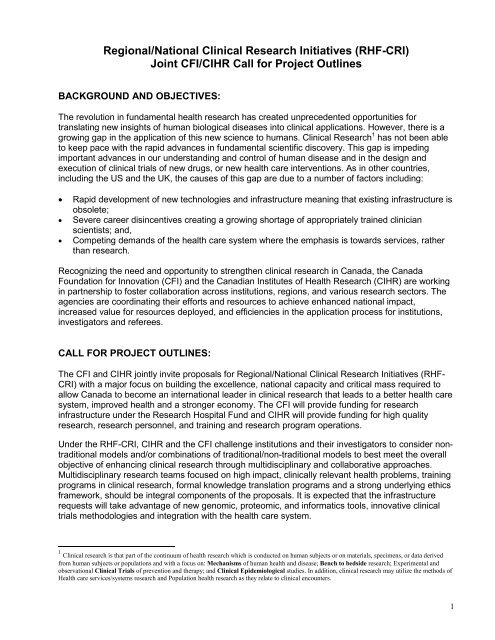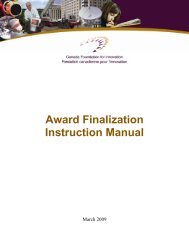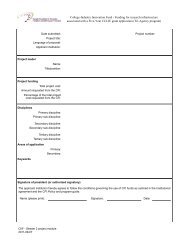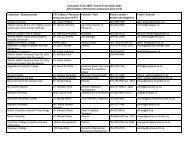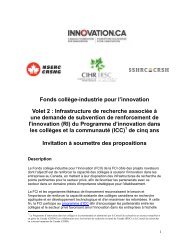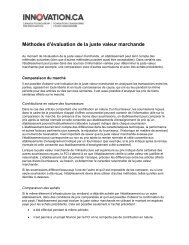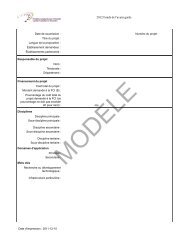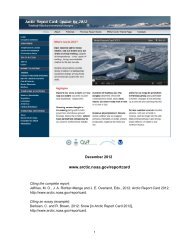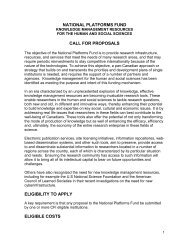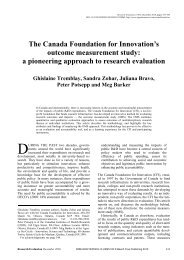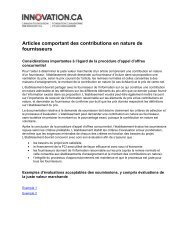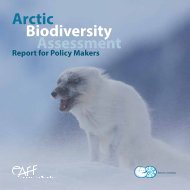Regional/National Clinical Research Initiatives (RHF-CRI) - Canada ...
Regional/National Clinical Research Initiatives (RHF-CRI) - Canada ...
Regional/National Clinical Research Initiatives (RHF-CRI) - Canada ...
You also want an ePaper? Increase the reach of your titles
YUMPU automatically turns print PDFs into web optimized ePapers that Google loves.
<strong>Regional</strong>/<strong>National</strong> <strong>Clinical</strong> <strong>Research</strong> <strong>Initiatives</strong> (<strong>RHF</strong>-<strong>CRI</strong>)<br />
Joint CFI/CIHR Call for Project Outlines<br />
BACKGROUND AND OBJECTIVES:<br />
The revolution in fundamental health research has created unprecedented opportunities for<br />
translating new insights of human biological diseases into clinical applications. However, there is a<br />
growing gap in the application of this new science to humans. <strong>Clinical</strong> <strong>Research</strong> 1 has not been able<br />
to keep pace with the rapid advances in fundamental scientific discovery. This gap is impeding<br />
important advances in our understanding and control of human disease and in the design and<br />
execution of clinical trials of new drugs, or new health care interventions. As in other countries,<br />
including the US and the UK, the causes of this gap are due to a number of factors including:<br />
• Rapid development of new technologies and infrastructure meaning that existing infrastructure is<br />
obsolete;<br />
• Severe career disincentives creating a growing shortage of appropriately trained clinician<br />
scientists; and,<br />
• Competing demands of the health care system where the emphasis is towards services, rather<br />
than research.<br />
Recognizing the need and opportunity to strengthen clinical research in <strong>Canada</strong>, the <strong>Canada</strong><br />
Foundation for Innovation (CFI) and the Canadian Institutes of Health <strong>Research</strong> (CIHR) are working<br />
in partnership to foster collaboration across institutions, regions, and various research sectors. The<br />
agencies are coordinating their efforts and resources to achieve enhanced national impact,<br />
increased value for resources deployed, and efficiencies in the application process for institutions,<br />
investigators and referees.<br />
CALL FOR PROJECT OUTLINES:<br />
The CFI and CIHR jointly invite proposals for <strong>Regional</strong>/<strong>National</strong> <strong>Clinical</strong> <strong>Research</strong> <strong>Initiatives</strong> (<strong>RHF</strong>-<br />
<strong>CRI</strong>) with a major focus on building the excellence, national capacity and critical mass required to<br />
allow <strong>Canada</strong> to become an international leader in clinical research that leads to a better health care<br />
system, improved health and a stronger economy. The CFI will provide funding for research<br />
infrastructure under the <strong>Research</strong> Hospital Fund and CIHR will provide funding for high quality<br />
research, research personnel, and training and research program operations.<br />
Under the <strong>RHF</strong>-<strong>CRI</strong>, CIHR and the CFI challenge institutions and their investigators to consider nontraditional<br />
models and/or combinations of traditional/non-traditional models to best meet the overall<br />
objective of enhancing clinical research through multidisciplinary and collaborative approaches.<br />
Multidisciplinary research teams focused on high impact, clinically relevant health problems, training<br />
programs in clinical research, formal knowledge translation programs and a strong underlying ethics<br />
framework, should be integral components of the proposals. It is expected that the infrastructure<br />
requests will take advantage of new genomic, proteomic, and informatics tools, innovative clinical<br />
trials methodologies and integration with the health care system.<br />
1 <strong>Clinical</strong> research is that part of the continuum of health research which is conducted on human subjects or on materials, specimens, or data derived<br />
from human subjects or populations and with a focus on: Mechanisms of human health and disease; Bench to bedside research; Experimental and<br />
observational <strong>Clinical</strong> Trials of prevention and therapy; and <strong>Clinical</strong> Epidemiological studies. In addition, clinical research may utilize the methods of<br />
Health care services/systems research and Population health research as they relate to clinical encounters.<br />
1
Annex A provides some examples of potential models. The CFI and CIHR wish to maximize the<br />
likelihood of capitalizing on innovation and opportunity as conceptualized by investigators, hospitals,<br />
and provinces. Accordingly, CIHR and the CFI will consider all proposals that are consistent with the<br />
objectives of this initiative.<br />
WHAT ARE THE OBJECTIVES?<br />
The ultimate objective of the <strong>Regional</strong>/<strong>National</strong> <strong>Clinical</strong> <strong>Research</strong> <strong>Initiatives</strong> is to contribute to<br />
improved health for Canadians, a sustainable health care system, and a stronger economy through<br />
a focus on solving high-impact, clinically-relevant health problems. In order to achieve this<br />
overarching objective, the initiative aims to:<br />
• support high-quality research programs with potentially high-impact, clinically relevant health<br />
problems ;<br />
• support outstanding teams of talented and experienced researchers;<br />
• improve the national infrastructure for clinical research;<br />
• increase operational funding for clinical research;<br />
• provide superior training and mentorship environments in order to sustain Canadian talent and<br />
leadership in clinical research; and,<br />
• ensure that discoveries made in <strong>Canada</strong> are evaluated, further developed and implemented in<br />
<strong>Canada</strong>, maximizing health and economic benefits.<br />
WHO IS ELIGIBLE TO APPLY?<br />
Only research hospitals eligible to access the <strong>Research</strong> Hospital Fund can submit combined<br />
applications for the <strong>CRI</strong>. The eligibility criteria for a research hospital are the same as those for the<br />
Large-Scale Institutional Endeavours. For more details, please consult the "Large Scale Institutional<br />
Endeavours". Institutions or organizations that do not qualify as eligible institutions to receive CFI<br />
funding can participate as collaborators or partners of eligible institutions.<br />
Eligible research hospitals are not limited to participation in one <strong>RHF</strong>-<strong>CRI</strong> application.<br />
In deciding whether to submit a proposal, hospitals should take into consideration that the CFI will<br />
expect institutions to start the construction/renovation component of a project within 18 months of<br />
the award announcement. This means that contracts for construction or renovation must have been<br />
finalized, and the construction/renovation work begun.<br />
The time to put in place requested infrastructure should not be a limiting factor to implement the<br />
research program. It is mandatory that the research programs begin within 12 months of the official<br />
decision announcement.<br />
Both above requirements speak to the need for mature projects.<br />
For hospitals and teams of researchers wishing to apply to the <strong>CRI</strong> for CIHR funding only, without<br />
an infrastructure request, please refer to www.cihr-irsc.gc.ca for the more information.<br />
Eligibility criteria for all CIHR research funding (grant) programs apply. The business office of the<br />
institution of an eligible Nominated Principal Applicant generally administers CIHR funds. Please<br />
refer to the Eligibility Requirements for CIHR Grants and Awards regarding the eligibility<br />
requirements for individuals and institutions.<br />
2
Each application must designate a Project Leader. In order to be eligible for this role, the individual<br />
must fulfill the eligibility criteria of CIHR's Nominated Principal Applicant. The Project Leader must be<br />
a researcher with proven leadership capabilities and experience who will assume administrative<br />
responsibility for the <strong>RHF</strong>-<strong>CRI</strong>. Eligibility criteria for all CIHR research funding programs apply.<br />
Please refer to the Eligibility Requirements for CIHR Grants and Awards regarding the eligibility<br />
requirements for individuals and institutions.<br />
Randomized Controlled Trials (RCTs) will be considered under this Call for Project Outlines only if<br />
necessary background research or preliminary studies have been completed in order to justify the<br />
need for a RCT. Applicants who are considering submitting a Randomized Controlled Trial<br />
application in response to this Request for Applications MUST consult the CIHR RCT staff listed in<br />
Contact Information and are advised to familiarize themselves with the RCT specific guidelines and<br />
instructions, which are fully described in Randomized Control Trials.<br />
HOW MUCH FUNDING IS AVAILABLE?<br />
CIHR:<br />
At least $50 million will be available over 5 years from CIHR to support high quality research,<br />
research personnel, training and research program operations, for applications for either both <strong>RHF</strong>-<br />
<strong>CRI</strong> or for <strong>CRI</strong> only. For each proposal, a maximum of $2 million per year over five years will be<br />
awarded by CIHR. Although CIHR strongly encourages applicants to leverage these funds by<br />
seeking partnership support for these components, it is not a requirement.<br />
CFI:<br />
The CFI will contribute up to $100M for the infrastructure component of the <strong>RHF</strong>-<strong>CRI</strong>, i.e. a<br />
contribution of up to 40% of the total cost of the infrastructure. The CFI will entertain proposals<br />
requesting a CFI contribution between $2 to $10 million. <strong>Clinical</strong> infrastructure needs requiring a CFI<br />
contribution greater than $10M should be submitted under the Large-Scale Endeavour component of<br />
the <strong>RHF</strong>. In addition, the CFI will provide an amount equivalent to 30% of the CFI funding awarded<br />
towards the operation and maintenance costs of the infrastructure.<br />
HOW DO PROJECTS FIT INTO THE HOSPITAL STRATEGIC RESEARCH PLAN?<br />
Each research hospital submitting a proposal under the <strong>RHF</strong>-<strong>CRI</strong> must provide a Strategic <strong>Research</strong><br />
Plan (SRP) summary of no more than 3 pages that must include:<br />
• An outline of the major research themes of strategic importance to the hospital, focusing on those<br />
themes for which support is requested in the proposal;<br />
• A description of how the hospital will support these priority areas (e.g. institutional resources to<br />
capitalize on the infrastructure, creation of new academic staff positions, research chairs, etc.);<br />
• A description of the hospital’s current and projected research space requirements for the next five<br />
years;<br />
• An explanation of how this infrastructure project will help build capacity in the hospital’s strategic<br />
research priority areas, including:<br />
1. how it will enhance the attraction and retention of highly qualified researchers;<br />
2. how this investment will enhance the hospital’s capacity to support research, training and<br />
knowledge translation; and,<br />
3
3. how this support will build regional or national capacity for innovation and increase<br />
international competitiveness in these areas; and,<br />
• A description of the planning and approval process for the SRP at the hospital.<br />
HOW SHOULD HOSPITALS ENGAGE THEIR KEY PARTNERS, IN PARTICULAR THEIR<br />
PROVINCES?<br />
Hospitals are required to provide evidence that key partners, in particular their provinces, are<br />
engaged in the planning of the project. Provinces are recognized to be key stakeholders in research<br />
infrastructure projects in hospitals. As such, there must be close interactions between the<br />
institutions and their provincial government from the beginning of the process to take into<br />
consideration provincial priorities and opportunities.<br />
Hospitals are therefore required to demonstrate that they have discussed their proposed initiative<br />
upfront with their respective provinces, including their business plan. At the full application stage,<br />
institutions will be required to provide evidence of provincial support in the form of a letter, signed by<br />
the appropriate provincial authority such as a deputy minister or assistant deputy minister, indicating<br />
that the proposed project is aligned with provincial health strategy(ies) and will be feasible once<br />
appropriate partner support is found.<br />
Other partnerships and collaborations<br />
Proposals that represent active partnerships between community organizations and research teams<br />
based in institutions (including universities, colleges, hospitals, and affiliated research institutions)<br />
are encouraged.<br />
For community-focused proposals, the guiding principle for participation is that community groups<br />
are active, influential and ongoing participants in the research, training, mentoring and knowledge<br />
translation activities, and that their roles have been formally agreed upon in the spirit of ensuring<br />
equity and mutual benefits from the partnership.<br />
It is expected that the partners will contribute to the Knowledge Translation of the <strong>CRI</strong> through:<br />
• Project Design (formulating research agendas; providing input into the development of<br />
research and training projects); and,<br />
• Dissemination (synthesizing and disseminating findings; applying the research findings to<br />
inform policies, programs and/or practices, and in some cases, conducting the research).<br />
WHAT ARE ELIGIBLE COSTS?<br />
CFI<br />
The CFI will provide funding for up to 40% of the eligible infrastructure costs of a project. Partner<br />
contributions and cash expenditures by the institution themselves must have taken place after<br />
February 19, 2003. Eligible costs for the CFI under the <strong>Regional</strong>/<strong>National</strong> <strong>Clinical</strong> <strong>Research</strong><br />
<strong>Initiatives</strong> call will be the same as it is for the Large-Scale Institutional Endeavours, with an<br />
emphasis on space.<br />
CIHR<br />
CIHR funding will support high quality research, research personnel, training and research program<br />
operations.<br />
4
To guide applicants with respect to allowable costs and activities under the <strong>Regional</strong>/<strong>National</strong><br />
<strong>Clinical</strong> <strong>Research</strong> Initiative, applicants should review:<br />
1. Use of Grant Funds<br />
2. Guidelines for Awards.<br />
In the context of this initiative, CIHR funding can be used to support the following:<br />
• <strong>Research</strong> operating costs for the proposed collaborative research program, which must be<br />
distinct in its objectives from those for which team members currently receive funding;<br />
• Costs of data collection, database development and maintenance of information holdings directly<br />
related to the clinical research program;<br />
• Costs of regional, national and international networking activities, including collaboration,<br />
planning, and knowledge exchange activities, directly related to the clinical research program;<br />
• Salaries of research assistants, technicians, methodologists and other highly qualified personnel<br />
who will enhance the capacity, quality and productivity of the clinical research program;<br />
• Support of research trainees, at the rate specified by CIHR for trainees paid from research<br />
grants. All clinical research programs are expected to integrate necessary components to<br />
support an exceptional training environment;<br />
• Salary of a professional coordinator and/or administrative assistant;<br />
• Release time payments to enable employees of community partners to participate in the<br />
research program, limited to 50% of salary costs, and an overall maximum of $100,000 per year;<br />
• A maximum of $20,000 annually for a release time stipend for the project leader;<br />
• Establishment funds and salary for new investigators joining the team (new investigators are<br />
within the first five years of their independent research careers). Salary contributions paid for by<br />
the Grant must not exceed the stipend paid to CIHR New Investigators ($60,000 per annum<br />
including fringe benefits). Those paid from the Grant cannot also hold a <strong>Canada</strong> <strong>Research</strong> Chair<br />
or another salary award. Note that new investigators paid from the grant can not be listed as coapplicants<br />
on the grant application. Similarly, they can not be listed as co-investigators on the<br />
grant after it is approved; however they can be considered members of the team;<br />
• Costs involved in linkage with and dissemination of research findings to those who use the<br />
results, as appropriate for the research program, (including other researchers, the public,<br />
practitioners and policy communities, and the industrial sector); and,<br />
• Costs involving website development, office supplies, and education and development costs in<br />
good clinical research practice.<br />
With the exception of co-applicants who are trainees or research associates, co-applicants may not<br />
receive a salary, stipend, or honorarium from CIHR grants on which they are a co-applicant (as<br />
described in Participant Applicant Categories for CIHR Grants). The only exception is the release<br />
time stipends for the team leader and employees of community partners as described.<br />
The full application must provide a detailed justification of all costs.<br />
WHAT IS THE APPLICATION PROCESS?<br />
The CFI and CIHR expect institutions to closely work with one another to ensure that a coordinated<br />
approach is followed when submitting project outlines for <strong>Regional</strong>/<strong>National</strong> <strong>Clinical</strong> <strong>Research</strong><br />
<strong>Initiatives</strong>. As mentioned previously, a few models are provided as examples, but CIHR and the CFI<br />
also encourage institutions to explore different approaches from those three models described in<br />
5
Annex A, taking into account the goals of the <strong>Regional</strong>/<strong>National</strong> <strong>Clinical</strong> <strong>Research</strong> Initiative and the<br />
<strong>Research</strong> Hospital Fund and the evaluation criteria outlined below.<br />
It is important to note that proposals to the <strong>RHF</strong>-<strong>CRI</strong> and to the <strong>CRI</strong> have the same deadlines and<br />
will undergo the same review process. They will be evaluated by the same Assessment<br />
Committee.<br />
Eligible applicants will submit:<br />
By April 16, 2007: 12 paper copies of the Project Outline to CIHR, accompanied by the hospital’s<br />
Strategic <strong>Research</strong> Plan summary, and the signed following forms: CFI’s “Collection, Use and<br />
Disclosure of Personal Information” and CIHR’s “Applicant Consent Form for Use and Disclosure of<br />
Personal Information Provided to CIHR for Peer Review”.<br />
If invited to submit a full application:<br />
• By October 9, 2007: a complete electronic application, as well as complete paper copies<br />
(number to be determined at invitation) of the application, including floor plans for construction.<br />
In addition, the applicant must provide a letter of support, signed by the appropriate provincial<br />
authority, indicating that the proposed project is aligned with provincial health strategy(ies) and<br />
will be feasible with appropriate partner support. In this regard, letters from partners confirming<br />
their partner contributions to the project are also required.<br />
See Annex B for full competition schedule and RCT deadline requirements.<br />
Project Outline<br />
The Project Outline will consist of a maximum of eight (8) pages of written text, in which the<br />
following points must be addressed:<br />
• the key elements of the clinical research program, its innovative and multi-disciplinary nature<br />
and planned activities, and the anticipated impact of the program on the health of Canadians<br />
and other socio-economic benefits to <strong>Canada</strong>;<br />
• justifications about why this proposal is essential and will bring added value to the Canadian<br />
clinical research enterprise and how the objectives cannot be met otherwise;<br />
• a short description of the requested and/or the existing infrastructure;<br />
• an explanation of how this clinical infrastructure will build on and complement other<br />
investments already made at the regional, national and international levels, and allow for new<br />
and different activities to advance and enhance the achievements of the research program,<br />
and how this resource will be made available to researchers, regionally, nationally and<br />
internationally, where appropriate;<br />
• an overview of the training opportunities for clinical researchers and other highly qualified<br />
personnel (HQP) and, where appropriate, how training centres located in different places<br />
plan to interact/coordinate with one another;<br />
• the nature and extent of the collaboration among investigators across the country, with the<br />
anticipated value added to the research program through the formation of this collaboration;<br />
and,<br />
• the approach for the knowledge translation strategy to ensure the desired impact.<br />
An additional 2 pages of diagrams or illustrations can also be included with the Project Outline. No<br />
other additional material will be accepted.<br />
6
<strong>National</strong>/<strong>Regional</strong> <strong>Clinical</strong> <strong>Research</strong> <strong>Initiatives</strong> proposals including Randomized Controlled Trials<br />
(RCTs) as part of their proposal must indicate so in the cover letter.<br />
The Project Outline must also be accompanied by a covering letter signed by the<br />
President/CEO (or his/her authorized signatorie) of the leading institution that will receive<br />
funding through the initiative, and by the designated project leader. The letter should also<br />
include all of the following:<br />
1. the title of the <strong>Regional</strong>/<strong>National</strong> <strong>Clinical</strong> <strong>Research</strong> Initiative (<strong>RHF</strong>-<strong>CRI</strong>)<br />
2. the name of the lead institution<br />
3. the name of the project leader<br />
4. the project leader’s CFI PIN number 2<br />
5. the project leader’s CIHR PIN number 3<br />
6. the estimated total project cost<br />
7. the amount requested from the CFI<br />
8. the amount requested from CIHR<br />
9. five (5) keywords describing the project<br />
10. if an RCT will be part of the application<br />
The Project Outline must follow the following formatting guidelines:<br />
Attached documents may be prepared in the word processing software package of your choice,<br />
printed and included with the application form. Failure to follow these guidelines may result in the<br />
administrative withdrawal of the Project Outline.<br />
• Documents can be prepared with the word processing software of your choice, using only letter<br />
size (21.25 X 27.5 cm / 8.5” X 11”) white paper for all attachments<br />
• Print on one side of the paper only. A font size of 12 point, black ink. Six lines per inch. No<br />
condensed type or spacing.<br />
• A minimum margin of 2 cm (3/4 inch) around the page is mandatory.<br />
• Observe page limitations, additional pages may NOT be added unless specified.<br />
• Photocopies must be single-sided.<br />
Access to Information Act and Privacy Act, and the Personal Information Protection and<br />
Electronic Documents Act (PIPEDA)<br />
2 To obtain a CFI PIN the project leader must register on the CFI web-site (https://www2.innovation.ca/pls/fci/FCIEN.base). A researcher may only<br />
have one PIN in the CFI database. If you already have a PIN, then you should use it. If you have ever been part of a previous application to the CFI or<br />
the <strong>Canada</strong> <strong>Research</strong> Chairs, then you probably already have a PIN. If you wish to find out if you are already registered, you can contact the CFI<br />
(pin.nip@innovation.ca) with your name, research institution and department. We will respond to the query by the next business day.<br />
3 To obtain a CIHR PIN, the principal applicant must register on CIHR web site at https://cihr-irsc.fcar.qc.ca/pls/crm/CRMEN.inscrip . You will have<br />
to login to the PIN form screen to request a PIN and create a password. This is an on-line submission. You will be notified by e-mail within one working<br />
day of submission when CIHR has granted you access to web forms. If you are an existing CIHR client, you will have to enter your PIN, and your<br />
password.<br />
Your PIN is your unique identifier, and remains active for the duration of your association with CIHR. One working day is typically required to process<br />
PIN requests; however, longer processing times may be required during peak periods. If you previously registered and have forgotten your PIN or<br />
Password do not re-register. Instead, refer to the Search for PIN or Password page or contact the CIHR Information Desk for assistance at 1-888-603-<br />
4178 (option 1) or by e-mail at pin-nip@cihr-irsc.gc.ca.<br />
Each time you wish to log into the system, you will need your CIHR PIN as well as the password you have created. We suggest that you write down<br />
your PIN and password and keep them in a safe place. (Please note: the system is case sensitive).<br />
7
All personal information collected by CIHR and the CFI about applicants is used to review<br />
applications, to recruit reviewers, to administer and monitor grants and awards, to compile statistics,<br />
and to promote and support health research in <strong>Canada</strong>. Consistent with these purposes, applicants<br />
should also expect that information collected by CIHR may be shared as described in Use and<br />
Disclosure of Personal Information Provided to CIHR for Peer Review and in CFI’s “Collection, Use<br />
and Disclosure of Personal Information”.<br />
CIHR and the CFI are subject to the Access to Information Act and the Privacy Act, therefore the<br />
requirements of these two statutes will apply to all information under CIHR's and CFI’s control<br />
including, without limitation, cost-sharing agreements related to this Call for Project Outlines and all<br />
matters pertaining thereto.<br />
Send the completed Project Outline package by courier to:<br />
RE: "<strong>National</strong>/<strong>Regional</strong> <strong>Clinical</strong> <strong>Research</strong> <strong>Initiatives</strong> - Joint CFI/CIHR Call for Project Outlines"<br />
<strong>Clinical</strong> <strong>Research</strong> Initiative<br />
Canadian Institutes of Health <strong>Research</strong><br />
Room 97, 160 Elgin Street<br />
Address locator: 4809A<br />
Ottawa, Ontario K1A 0W9<br />
Contact Information<br />
For questions on this initiative, contact:<br />
Julie Senécal<br />
<strong>Clinical</strong> <strong>Research</strong> Initiative<br />
Canadian Institutes of Health <strong>Research</strong><br />
Telephone: (613) 941-0057<br />
Fax: (613) 954-1800<br />
Email: cri-irc@cihr-irsc.gc.ca<br />
What is the Review Process for Project Outlines?<br />
Assessment Criteria<br />
In reviewing the project outlines, the CFI and CIHR will apply the following three criteria:<br />
1. Quality of <strong>Research</strong> and Need for the Requested Infrastructure and/or<br />
Appropriateness of the Existing Infrastructure<br />
• Quality, innovation and transformative potential of the research that could not be<br />
performed under existing programs;<br />
• Feasibility and sustainability of the proposed research plan and how it has the potential to<br />
generate valid, reliable and useful knowledge;<br />
• Evidence of the expertise, talent, and experience of the team in conducting high quality<br />
clinical research;<br />
• Where applicable to the type of research proposed, evidence that the proposal takes into<br />
account the social, ethical, cultural and environmental factors surrounding the research<br />
problem;<br />
8
• Appropriateness, effectiveness and efficiency of the requested and/or existing<br />
infrastructure in supporting the proposed research, housing equipment, or bringing<br />
researchers and highly qualified personnel together;<br />
• If there is construction involved, the likelihood that the construction of the facility will start<br />
within 18 months of the official decision announcement;<br />
• Evidence that the infrastructure requests is not a limiting factor to implement the research<br />
program and that the research programs can begin within 12 months of the official<br />
decision announcement.<br />
2. Contribution to Strengthening the Capacity for Innovation<br />
• Build regional or national capacity for innovation and excellence in clinical research and<br />
for international competitiveness;<br />
• Create stimulating and enriched environment for training clinical researchers and other<br />
highly qualified personnel and to support high quality clinician-scientists;<br />
• Strengthen multidisciplinary approaches, collaborations among clinician-researchers, and<br />
collaborations or partnerships with other institutions and sectors to allow for better<br />
research, knowledge translation, and technology development, and for a more effective<br />
and efficient use of available resources.<br />
3. Potential for Impact - Benefits of the <strong>Research</strong> to <strong>Canada</strong><br />
• Importance of the health problem being addressed;<br />
• Generate knowledge that can be translated into improved health for Canadians, more<br />
effective Canadian health services and products, and a better Canadian health care<br />
system;<br />
• Contribute to job creation and economic growth in <strong>Canada</strong>.<br />
To be invited, a proposal must satisfy all three criteria to a degree appropriate to the size and<br />
complexity of the proposal.<br />
Review Process for the Project Outlines<br />
CIHR and the CFI will undertake a joint review of the project outlines to select those that show the<br />
most promise, and invite full proposals. To do this review, the agencies will convene an International<br />
Assessment Committee, with broad expertise in clinical research and clinical research management.<br />
In addition, the CFI and CIHR will strive to achieve a balanced representation of gender, region and<br />
research sector. Collectively, the Committee will be competent to review applications in both official<br />
languages.<br />
In order to maximize the opportunity for the creation of national/regional clinical research<br />
infrastructure across the country and range of health issues, and to encourage promising<br />
applications in common research areas to collaborate together, it is possible that consultations with<br />
individual institutions will be initiated following the review of the Project Outlines.<br />
The institution and project leader will be informed of the outcome of the review process.<br />
Full Proposals<br />
The requirements for the full proposal will be similar but more detailed than the evaluation criteria<br />
described in the project outline. The following additional evaluation criteria are provided as they can<br />
influence decisions to apply:<br />
1. Evidence of alignment with the hospital Strategic <strong>Research</strong> Plan;<br />
9
2. Partnership Support, including provincial support;<br />
3. The sustainability of the clinical research infrastructure reflected in a business plan; and,<br />
4. Randomized Controlled Trial (RCT) requirements: For each RCT, a project outline shall be<br />
submitted to CIHR on August 1 st 2007 (consult the Competition Deadline Schedule for<br />
Randomized Controlled Trials Program).<br />
All further details regarding the full applications will be found in the electronic form and in the<br />
accompanying instructions.<br />
Institutions that submit applications to both this Call for proposals and the Large-Scale Institutional<br />
Endeavours component of the <strong>Research</strong> Hospital Fund will be asked to reference their Large-Scale<br />
Institutional Endeavours in a specific section of the application form for <strong>Regional</strong>/<strong>National</strong> <strong>Clinical</strong><br />
<strong>Research</strong> <strong>Initiatives</strong> (<strong>RHF</strong>-<strong>CRI</strong>) and vice versa.<br />
What is the Review Process for the Full Proposals?<br />
Assessment Criteria<br />
In reviewing the full proposals, the CFI and CIHR will apply the following three criteria:<br />
1. Quality of the <strong>Research</strong> and Need for the Requested Infrastructure and/or<br />
Appropriateness of the Existing Infrastructure<br />
• The quality, innovativeness and transformative nature of the proposed clinical research<br />
research;<br />
• Where applicable to the type of research proposed, evidence that the proposal takes into<br />
account the social, ethical, cultural and environmental factors surrounding the research<br />
problem;<br />
• Evidence of the expertise, talent, and experience of the team in conducting high quality<br />
clinical research;<br />
• Appropriateness, efficiency and effectiveness of the requested and/or existing<br />
infrastructure for the proposed research, and for the development of enhanced integrated<br />
facilities;<br />
• If there is construction involved, the likelihood that the construction of the facility will start<br />
within 18 months of the official decision announcement;<br />
• Evidence that the infrastructure request is not a limiting factor to implement the research<br />
program and that the research programs can begin within 12 months of the official<br />
decision announcement.<br />
2. Contribution to Strengthening the Capacity for Innovation<br />
• The project’s potential for building regional or national capacity for innovation and for<br />
international competitiveness in health research along with expected increased needs for<br />
additional clinical research funding;<br />
• The potential of the project to create a stimulating and enriched environment for training<br />
researchers in clinical research and other highly qualified personnel, and to support high<br />
quality researchers in clinical research;<br />
• The research excellence of the Mentors, and their success in training researchers in<br />
clinical research;<br />
• The project’s potential for raising the national standard for best practices in training and<br />
dissemination of curriculum materials in clinical research;<br />
• The capacity of the project to strengthen multidisciplinary collaborations among clinicianresearchers,<br />
and collaborations or partnerships with other institutions and sectors to<br />
10
allow for better research, knowledge translation, and technology development, and for a<br />
more effective and efficient use of available resources;<br />
• The effectiveness of the management, operation and maintenance of the clinical<br />
research infrastructure on an ongoing basis;<br />
• The sustainability of the clinical research infrastructure reflected in a business plan.<br />
3. Potential Benefits of the <strong>Research</strong> to <strong>Canada</strong><br />
• Importance of the health problem being addressed<br />
• The project’s potential for translating research results into improvements to the health<br />
and quality of life of Canadians, including the creation of policies and practices, more<br />
effective health services and products and a better health care system;<br />
• The project’s potential for contributing to job creation and economic growth.<br />
To be funded, a proposal must satisfy all three criteria to a degree appropriate to the size and<br />
complexity of the proposal.<br />
Review Process<br />
The CFI and CIHR will undertake a joint review of full proposals. A core of members of the original<br />
international Assessment Committee that reviewed the project outlines will review the full proposals.<br />
New members will be added to the Committee to ensure that its expertise is appropriate and<br />
complete.<br />
As mentioned above, the Assessment Committee will also take into account the following factors in<br />
its evaluation of the proposals<br />
1. the Strategic <strong>Research</strong> Plan of the institution;<br />
2. evidence of support from partners, including provinces;<br />
3. the sustainability of the clinical research infrastructure reflected in a business plan; and,<br />
4. CIHR Randomized Controlled Trial (RCT) project outline peer review committee<br />
recommendations.<br />
The Assessment Committee recommendations will transmit a single recommendation on each<br />
proposal to the CFI and CIHR.<br />
How Will the Decisions Be Made?<br />
The CFI Board of Directors and CIHR Governing Council will make the final decision for each<br />
proposal. The final decision could be for full funding, partial funding or no funding.<br />
Summary comments will be provided to the institutions for all proposals.<br />
Please refer to Annex C for CIHR Conditions of Funding.<br />
11
ANNEX A<br />
The CFI and CIHR challenge institutions and their investigators to consider non-traditional models<br />
and/or combinations of traditional/non-traditional models to best meet the overall objective of<br />
enhancing clinical research through multidisciplinary and collaborative approaches.<br />
Following extensive consultation by CIHR, some types of infrastructure have been identified by the<br />
clinical research community and are provided below. However, it is recognized that the required<br />
infrastructure needs may potentially be addressed by other models and/or combinations of those<br />
outlined below. The CFI and CIHR wish to maximize the likelihood of capitalizing on innovation and<br />
opportunity as conceptualized by investigators, hospitals, and provinces. Accordingly the CFI and<br />
CIHR will consider proposals for clinical research infrastructure that are different from those outlined<br />
below, as long as they are consistent with the principles of the initiative.<br />
1) <strong>Clinical</strong> <strong>Research</strong> Networks<br />
A well defined multicentre interdisciplinary Network focused on a specific disease area hosted at a<br />
specific Institution and lead by an outstanding researcher with collaborators across a region or<br />
across <strong>Canada</strong>. This Network would focus on the development of innovative diagnostic suites,<br />
taking advantage of accumulating biobanks, to be used in evaluating new therapies and patient<br />
responsiveness. This Network would incorporate innovative training programs for future leaders in<br />
clinical research and would develop new biostatistical methodologies.<br />
2) <strong>Clinical</strong> <strong>Research</strong> Centres<br />
<strong>National</strong>ly/regionally networked centres that will be located within research hospitals and that will<br />
have the capacity for excellent clinical research, including all phases of clinical trial development,<br />
training, and knowledge translation.<br />
These centres will have the necessary infrastructure and critical mass of clinical researchers to<br />
enable leading-edge advances of national and international impact. Depending upon regional<br />
strengths and opportunities, some centres with strong basic biomedical research will focus on<br />
translational research, facilitating Phase 1 and 2 clinical trials. Others will have close interactions<br />
with health care systems/services and population health research. <strong>Regional</strong> hub-and-spoke<br />
relationships will broaden the reach and influence of each centre, which will be networked with other<br />
clinical research centres across the country.<br />
This Canadian model will incorporate some of the philosophy of the US' <strong>National</strong> Institutes of Health<br />
(NIH) General <strong>Clinical</strong> <strong>Research</strong> Centres and specialty clinical research centres, but will be more<br />
oriented to the future of clinical research (multidisciplinarity: crossing all 4 themes of biomedical,<br />
clinical, health systems/policy and population health; and engagement of the community and<br />
referring centres) and its interactions will extend regionally and nationally. A key feature of these<br />
research centres will be technologically and organizationally state-of-the-art networking which links<br />
the centres and dramatically increases the critical mass of <strong>Canada</strong>'s clinical research endeavour.<br />
CIHR will support the new Leaders in clinical research in each centre. There will be a requirement<br />
for programs of knowledge translation as an important part of the mission of each Centre.<br />
3) <strong>Clinical</strong> <strong>Research</strong> Technology Platforms<br />
Examples of such Platforms include clinical trials methods centres and cutting edge<br />
tissue/databanks with linked molecular and imaging platforms which position <strong>Canada</strong> to become a<br />
global leader in clinical research. These platforms would offer technology support to research<br />
12
projects funded by CIHR and others on a cost-recovery basis. Formal networking, clinical research<br />
training, and knowledge translation would be integral to these technology platforms. The salary<br />
support of highly qualified personnel (e.g., biostatisicians for clinical trial method centres) will be<br />
available through this model. At least two general types of technology platforms are needed:<br />
• Methods centres provide clinical trials support (protocol development, case report forms, data<br />
management, reports and analysis, regulatory advice, and management);<br />
• Wet and dry human data banks are concerned with the collection, curation, and management<br />
of secure, high-quality, ethically appropriate, and readily available data. These platforms would<br />
provide tissue and serum repositories with standard collection and storage procedures, and<br />
modern analytical and diagnostic capabilities. The establishment of such infrastructure is at a<br />
very preliminary stage in <strong>Canada</strong> and yet the availability of standardized human biologicals and<br />
other data is vital to modern clinical research.<br />
13
Annex B<br />
Schedule for the two <strong>RHF</strong> competitions<br />
Call for Proposals<br />
(<strong>Clinical</strong> <strong>Research</strong> <strong>Initiatives</strong> + Large-Scale Institutional Endeavours)<br />
Mid-February, 2007<br />
<strong>Clinical</strong> <strong>Research</strong> <strong>Initiatives</strong><br />
Large-Scale Institutional Endeavours<br />
Project Outlines<br />
April 16, 2007<br />
Review by AC<br />
Week of May 28, 2007<br />
Invitations for full proposals<br />
By middle of June 2007<br />
Randomized Controlled Trials (RCT)<br />
Outline submission to CIHR<br />
August 1, 2007<br />
Notifications of Intent<br />
April 20, 2007<br />
Full proposals<br />
September 11, 2007<br />
Full proposals<br />
Week of October 9, 2007<br />
RCT Outline CIHR Peer Review<br />
December 2007<br />
Expert Review<br />
Oct. to Dec. 2007<br />
CIHR/CFI AC<br />
Week of January 28, 2008<br />
IAC<br />
Week of February 11, 2008<br />
CIHR Governing Council and CFI Board decisions<br />
Early March 2008<br />
RCT Registration Deadline to CIHR<br />
August 1, 2008<br />
RCT Full applications to CIHR<br />
September 1, 2008<br />
RCT Notification of Decision by CIHR<br />
Announcement of results<br />
March 2008<br />
14
ANNEX C<br />
CIHR Conditions of Funding<br />
All conditions specified in CIHR General Grants and Awards Policies shall apply to applications<br />
funded through this competition. Conditions cover areas such as Applicant and Institutional<br />
Responsibilities, Ethics, Official Language Policy, Access to Information and Privacy Acts, and<br />
Acknowledgement of CIHR Support. Successful applicants will be informed of any special financial<br />
conditions prior to the release of funds or when they receive CIHR's Authorization for Funding (AFF)<br />
document.<br />
Access to Information Act and Privacy Act, and the Personal Information Protection and<br />
Electronic Documents Act (PIPEDA)<br />
All personal information collected by CIHR about applicants is used to review applications, to recruit<br />
reviewers, to administer and monitor grants and awards, to compile statistics, and to promote and<br />
support health research in <strong>Canada</strong>. Consistent with these purposes, applicants should also expect<br />
that information collected by CIHR may be shared as described in Use and Disclosure of Personal<br />
Information Provided to CIHR for Peer Review.<br />
CIHR as a federal entity is subject to the Access to Information Act and the Privacy Act, therefore<br />
the requirements of these two statutes will apply to all information located in CIHR’s premises<br />
including, without limitation, cost-sharing agreements related to this Request for Applications and all<br />
matters pertaining thereto.<br />
While respecting the application of the Privacy Act to federal entities, all signing parties involved in a<br />
collaborative agreement will also be bound by the Personal Information Protection and Electronic<br />
Documents Act (PIPEDA). All personal information (as identified by the PIPEDA) collected, used or<br />
disclosed in the course of any commercial activity under collaborative agreements related to the<br />
Request for Applications will be collected, used and disclosed in compliance with the PIPEDA.<br />
Communications Requirements<br />
In addition to following the policies relating to the Acknowledgment of CIHR’s Support,<br />
<strong>National</strong>/<strong>Regional</strong> <strong>Clinical</strong> <strong>Research</strong> <strong>Initiatives</strong> (<strong>RHF</strong>-<strong>CRI</strong>) grant recipients will also be required to<br />
adhere to special branding requirements as a condition of receiving a <strong>National</strong>/<strong>Regional</strong> <strong>Clinical</strong><br />
<strong>Research</strong> Initiative (<strong>RHF</strong>-<strong>CRI</strong>). The official name is "CFI-CIHR <strong>Clinical</strong> <strong>Research</strong> Initiative in (area of<br />
research)." In cases where there is another major funding partner a shared title should be<br />
considered. The format of a shared title is " CFI-CIHR/(partner name) <strong>Clinical</strong> <strong>Research</strong> Initiative in."<br />
The name must be used in all communication and promotion relating to the <strong>National</strong>/<strong>Regional</strong><br />
<strong>Clinical</strong> <strong>Research</strong> <strong>Initiatives</strong> (<strong>RHF</strong>-<strong>CRI</strong>). A team name must be proposed as part of the application<br />
for a <strong>National</strong>/<strong>Regional</strong> <strong>Clinical</strong> <strong>Research</strong> (<strong>RHF</strong>-<strong>CRI</strong>). Successful applicants and their host<br />
institutions will be required to agree in writing to proper use of the name as well as the CIHR and<br />
CFI logos on appropriate communications materials such as brochures, letterhead, publications and<br />
media materials. Recognition guidelines, including instructions on logo use, will be provided to<br />
successful applicants as part of the approval package.<br />
15
Monitoring, Performance Measurement and Evaluation<br />
CIHR is committed to demonstrating results to Canadians for the money invested in health<br />
research. Therefore, processes for monitoring progress and appropriate use of funds, as well as for<br />
performance measurement and program evaluation are in place. As a result, grant recipients must:<br />
• adhere CIHR's reporting requirements and provide required information in a timely<br />
fashion. Grantees are required to submit an annual Progress Report describing the<br />
progress made since the start of the grant. CIHR will cancel the last 12 months of the<br />
grant if the progress is unacceptable and will cancel the final two years of the grant if it does<br />
not receive a report by the dates requested. Details about the Progress Reports will be<br />
provided to the grant recipients along with their Notification of Award.<br />
• contribute to the monitoring, review and evaluation of CIHR's programs, policies and<br />
processes by participating in evaluation studies, surveys, workshops, audits and providing<br />
data or reports as required for the purpose of collecting information to assess progress and<br />
results;<br />
• encourage their associates, trainees and administration to participate in the monitoring,<br />
review and evaluation of CIHR's programs, policies and processes as required.<br />
16


